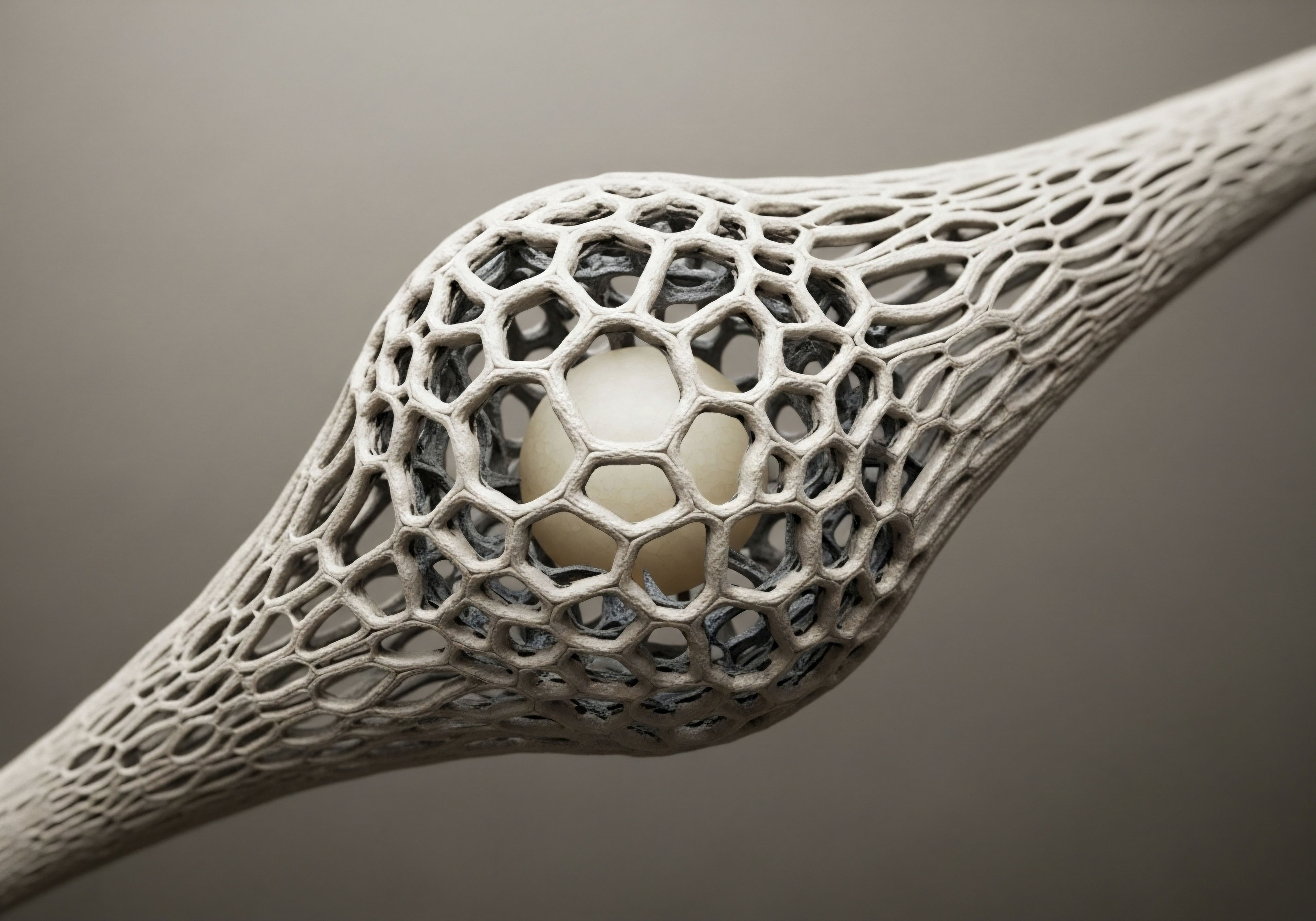

The Foundation of Your Elevated Existence
Your endocrine system is the master orchestrator of your biological symphony. It is the network of glands that produce hormones ∞ the chemical messengers that regulate nearly every critical function within your body. These signals dictate your energy levels, dictate your mood, influence your metabolic rate, shape your body composition, govern your cognitive acuity, and even underpin your drive and reproductive capacity. To truly architect peak performance and enduring vitality, one must first understand and master this intricate terrain.
Consider the cascade of effects from a well-regulated endocrine system. Optimal testosterone levels in men, and estrogen/progesterone in women, are not merely about sexual function; they are fundamental to sustained energy, robust mood, mental clarity, and the preservation of lean muscle mass.
Thyroid hormones, the body’s metabolic thermostats, dictate how efficiently your cells convert fuel into energy. Cortisol, often maligned as the “stress hormone,” plays a vital role in managing energy, inflammation, and immune response, but its dysregulation can dismantle health.
The endocrine system acts as a high-fidelity communication network, translating genetic predispositions and environmental inputs into tangible physiological outputs. When this network operates with precision, you experience consistent energy, sharp cognition, balanced emotions, and a resilient physical form.
When it falters, the symptoms manifest as fatigue, brain fog, stubborn weight gain, mood swings, and a general decline in your capacity to perform and thrive. Mastering this terrain means gaining command over these fundamental biological processes, transforming your body from a reactive entity into a finely tuned instrument of peak performance.
This mastery is not about passive acceptance of age-related decline or the random fluctuations of biology. It is about proactive engagement, understanding the underlying mechanisms, and implementing strategic interventions that recalibrate your internal chemistry for optimal function. It is the difference between merely existing and truly living at your biological apex. The endocrine system is your body’s central command, and understanding its intricacies is the first step toward unlocking your full potential.
Clinical data indicates that optimal testosterone levels are directly correlated with enhanced cognitive function, including memory and executive processing, in men across various age groups.

The Pillars of Hormonal Influence

Energy and Metabolic Regulation
Thyroid hormones (T3 and T4) are paramount for regulating your basal metabolic rate. They influence how quickly your body burns calories, generates heat, and utilizes energy substrates like carbohydrates and fats. Imbalances here can lead to sluggishness, weight management challenges, and a general deficit in physical and mental energy.

Mood and Cognitive Performance
Hormones like testosterone, estrogen, progesterone, and even cortisol, profoundly impact neurotransmitter systems in the brain. They influence mood stability, motivation, focus, learning, and memory. A balanced endocrine profile supports sharp cognitive function and emotional resilience, providing the mental edge required for high performance.

Body Composition and Musculoskeletal Health
Anabolic hormones, primarily testosterone and growth hormone, are critical for building and maintaining lean muscle mass and bone density. They also influence fat distribution. Optimizing these hormones is essential for achieving a powerful, functional physique and mitigating sarcopenia and osteoporosis associated with aging.

Stress Response and Resilience
The hypothalamic-pituitary-adrenal (HPA) axis governs your body’s response to stress. While acute cortisol release is adaptive, chronic elevation due to persistent stress can lead to adrenal dysregulation, immune suppression, and metabolic disturbances. Mastering your endocrine terrain involves strategies to manage this axis effectively.


The Blueprint for Endocrine Mastery
Achieving mastery over your endocrine terrain involves a systematic approach, grounded in precise diagnostics and informed intervention. It requires understanding the feedback loops that govern hormone production and implementing strategies that support optimal signaling and output. This is where the “Vitality Architect” mindset truly comes into play ∞ viewing your body as a sophisticated system to be engineered for peak performance.
The foundation of any optimization strategy lies in accurate assessment. This means moving beyond generalized blood work to embrace comprehensive panels that map your hormonal landscape. Key areas of focus include the hypothalamic-pituitary-gonadal (HPG) axis for sex hormones (testosterone, estrogen, progesterone), the hypothalamic-pituitary-thyroid (HPT) axis for thyroid function (TSH, Free T4, Free T3, reverse T3), and the hypothalamic-pituitary-adrenal (HPA) axis for cortisol and related stress markers. Furthermore, assessing growth hormone secretagogues, IGF-1, and key metabolic markers provides a holistic view.
Interventions are then tailored to address identified deficiencies or dysregulations. For the HPG axis, this often involves Testosterone Replacement Therapy (TRT) in men experiencing hypogonadism, or hormone optimization protocols for women. These therapies aim to restore physiological levels, not supra-physiological ones, thereby re-establishing balance and mitigating the downstream effects of low sex hormones. The goal is to mimic natural pulsatile release where possible and maintain levels within a healthy, functional range that supports vitality.
Peptide science represents a cutting-edge frontier in endocrine optimization. Peptides are short chains of amino acids that act as signaling molecules. For instance, Growth Hormone Releasing Peptides (GHRPs) and Growth Hormone Releasing Hormones (GHRHs) like Sermorelin or Ipamorelin stimulate the pituitary gland to release more growth hormone, supporting muscle repair, fat metabolism, and cellular regeneration. Other peptides target inflammation, metabolic pathways, or cognitive function, offering precise biological modulation.
Thyroid optimization is another critical component. This may involve prescription thyroid hormone replacement (e.g. levothyroxine, liothyronine) based on comprehensive thyroid panel results, not just TSH. The aim is to ensure adequate conversion and utilization of thyroid hormones at the cellular level, restoring metabolic efficiency and energy production.
Crucially, these interventions are not standalone solutions. They are integrated within a broader framework that includes foundational lifestyle pillars ∞ optimized sleep architecture, targeted nutrition designed to support hormonal production and reduce inflammation, and strategic exercise that balances anabolic stimulus with recovery. The endocrine system is deeply interconnected with these lifestyle factors; they are not merely adjuncts but integral components of the master blueprint.

Key Components of Endocrine Engineering

Diagnostic Precision
Comprehensive blood panels are non-negotiable. This includes assessing:
- Sex Hormones ∞ Total and free testosterone, estradiol, progesterone, SHBG, LH, FSH.
- Thyroid Hormones ∞ TSH, Free T4, Free T3, Reverse T3, thyroid antibodies.
- Adrenal Hormones ∞ Salivary or urinary cortisol diurnal patterns, DHEA-S.
- Growth Hormone Axis ∞ IGF-1, GH levels (often via stimulation tests).
- Metabolic Markers ∞ Fasting glucose, insulin, HbA1c, lipid profiles, inflammatory markers (hs-CRP).

Therapeutic Modalities
Interventions are selected based on diagnostic findings and individual goals:
- Hormone Replacement Therapy (HRT) ∞ Physiological replacement of testosterone, estrogen, progesterone, or thyroid hormones.
- Peptide Therapy ∞ Targeted signaling molecules like GH secretagogues (Sermorelin, Ipamorelin), metabolic peptides (e.g. Tesamorelin), or others influencing repair and regeneration.
- Nutrient Optimization ∞ Ensuring adequate intake of cofactors essential for hormone synthesis and receptor function (e.g. zinc, magnesium, vitamin D, B vitamins).
- Lifestyle Integration ∞ Sleep hygiene, stress management techniques (e.g. mindfulness, HRV training), targeted nutrition, and appropriate exercise protocols.

Mechanism of Action Spotlight ∞ Growth Hormone Secretagogues
Peptides like Sermorelin (a GHRH analog) and Ipamorelin (a GHRP) work by signaling the anterior pituitary gland. Sermorelin binds to GHRH receptors, stimulating the pulsatile release of Growth Hormone (GH). Ipamorelin mimics ghrelin, binding to the ghrelin receptor and inhibiting somatostatin (which suppresses GH release), thereby amplifying GH secretion. This leads to increased IGF-1 production in the liver, which mediates many of GH’s anabolic and metabolic effects, including muscle growth, fat lipolysis, and improved tissue repair.
Clinical studies on Sermorelin acetate demonstrate its efficacy in stimulating GH release, leading to improved lean body mass and reduced adiposity in adults with GH deficiency.


The Strategic Application of Optimization
The question of “when” to engage in endocrine optimization is not about waiting for a crisis, but about strategic timing for proactive self-mastery. It is about recognizing the subtle shifts in your biological performance and intervening before significant decline takes hold. This approach transforms health management from a reactive endeavor into a precision-driven strategy for sustained peak function.
The ideal moment for comprehensive endocrine assessment and potential optimization typically arises when an individual notices a decline in vitality that is not adequately explained by obvious lifestyle factors. This can manifest as persistent fatigue that sleep does not resolve, a noticeable decrease in muscle mass or strength despite consistent training, cognitive fog that impedes productivity, or a diminished libido.
These are not merely signs of “getting older” but critical data points indicating a potential recalibration is needed within your endocrine system.
For men, this often means evaluating testosterone levels starting in their late 20s or early 30s, as natural decline can begin around this age. For women, the assessment window shifts with perimenopause and menopause, but understanding baseline hormonal profiles in their 30s and 40s can provide invaluable context for managing the transition and maintaining vitality. Evaluating thyroid function should be a standard consideration for anyone experiencing persistent fatigue or metabolic challenges, regardless of age.
The “when” also pertains to the integration of lifestyle factors. Before considering pharmacological or peptide-based interventions, a rigorous evaluation and optimization of sleep, nutrition, exercise, and stress management is paramount. These foundational elements dictate the body’s baseline hormonal environment and influence the efficacy and safety of any subsequent interventions. For example, poor sleep can significantly disrupt cortisol and growth hormone rhythms, making optimization efforts less effective.
When interventions are deemed appropriate, the “when” extends to the monitoring and adjustment phase. Endocrine optimization is not a static prescription; it is a dynamic process. Regular follow-up assessments ∞ typically every 3-6 months depending on the intervention ∞ are crucial to track hormone levels, monitor for side effects, and fine-tune dosages or protocols. This iterative approach ensures that the system remains balanced and continues to serve your performance and vitality goals.
Consider the strategic application of peptides. While HRT addresses foundational hormone levels, peptides can be employed for more specific goals. For instance, a peptide like BPC-157 might be used for injury repair post-event, or a GH secretagogue might be introduced during periods of intense training or recovery to accelerate tissue regeneration. The “when” for these interventions is highly context-dependent, often tied to specific performance phases or recovery needs.

Timelines and Expectations

Initial Assessment and Baseline
Begin with a comprehensive diagnostic panel. This establishes your unique endocrine fingerprint, providing the data necessary for informed decisions. This step is foundational and should precede any significant intervention.

Lifestyle Optimization Phase
Dedicate a period (e.g. 4-12 weeks) to rigorously optimize sleep, nutrition, exercise, and stress management. Observe how your body responds. This phase informs the necessity and potential impact of further interventions.

Therapeutic Intervention Onset
Once interventions are initiated (e.g. TRT, thyroid support, peptides), expect a period of adjustment. For TRT, noticeable improvements in energy and mood may appear within weeks, with full effects on body composition taking months. Peptide effects can vary; some offer acute benefits, while others require consistent administration over weeks or months to elicit significant changes.

Monitoring and Recalibration
Regular follow-up diagnostics are essential. This allows for precise adjustments to dosage or therapy type, ensuring optimal physiological balance and mitigating potential adverse effects. This continuous feedback loop is the hallmark of sophisticated endocrine management.

Long-Term Vitality Architecture
Mastery is an ongoing process. Consistent monitoring, adaptation to life changes, and a commitment to foundational health practices are key to sustaining elevated performance and vitality over the long term.

The Zenith of Personal Power
Mastering your endocrine terrain is the ultimate act of biological self-determination. It is the transition from being a passenger in your own physiology to becoming the architect of your peak potential. By understanding the intricate language of hormones, leveraging precise diagnostics, and strategically applying evidence-based interventions, you unlock a level of vitality, cognitive performance, and physical resilience previously considered beyond reach.
This is not about chasing youth, but about engineering a future where your biological capacity aligns with your highest ambitions. The power to command your biological destiny resides within your endocrine system; learn to wield it.

Glossary

endocrine system

peak performance

thyroid hormones

growth hormone

hpg axis

endocrine optimization




